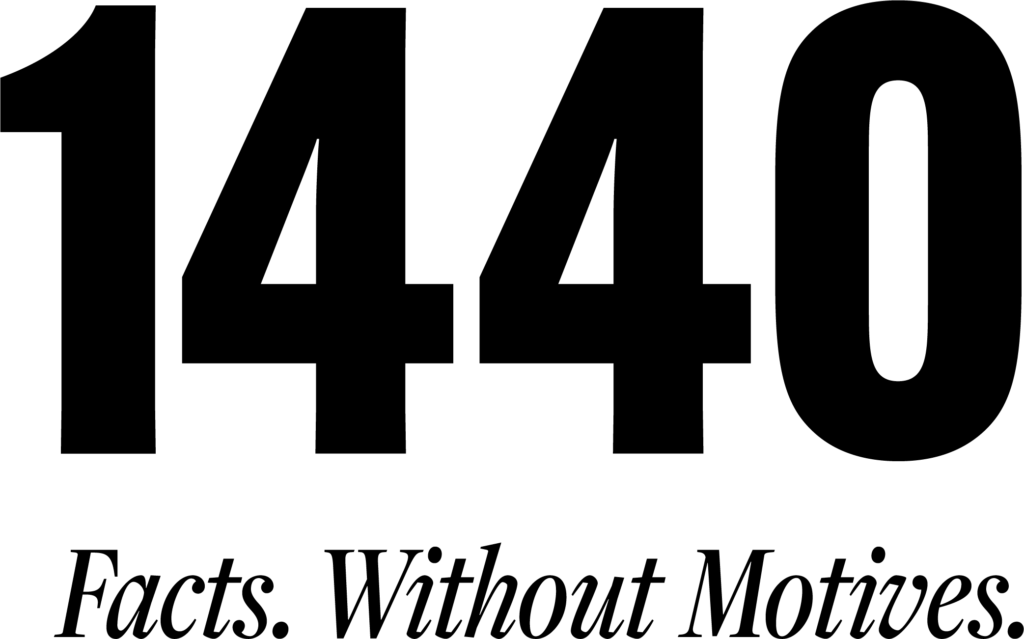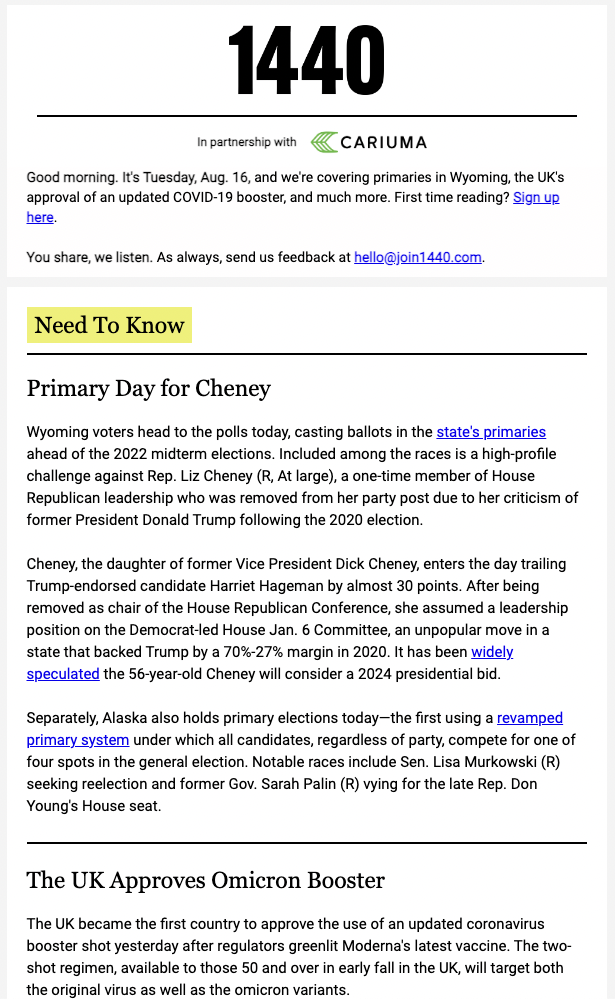|
Getting your Trinity Audio player ready...
|
In just four years, startup media brand 1440 has surpassed 2 million active newsletter subscribers driven by Americans’ growing appetite for unbiased and non-partisan news. Has it nailed its formula? 42 months of consecutive revenue growth and 8-figure annual revenue indicate it has, whilst also suggesting that impartiality is the antidote for doom-scrolling.
At WAN-IFRA’s recent World News Media Congress in Zaragoza, Rasmus Kleis Nielsen, Director of Reuters Institute couldn’t have been clearer – trust in news has hit an all-time low. Casting his eyes over the audience he challenged the assembled news publishers, “What will you do differently to convince readers to trust you?”
For upstart U.S. news brand 1440, the answer is clear: serve up a daily diet of fact-based, impartial news stories carefully curated by a team of editors, experts, and analysts. Designed to be read in under five minutes, the 1440 newsletter aims to serve the left, right, and center, all of whom are looking for facts without hidden motives.
1440 is an excellent example of a media company that gets it right. They pass up the low-hanging fruit of clickbait and sensationalism in favor of just the facts. The editorial staff’s diversity of opinion works as a natural check on bias, distilling events down to the essentials.
Diego Villena, The Coolist
Its readership profile, currently sitting at just over 2M active users – as well as a newsletter open rate of 53% – suggests it has got the balance right. Based on self-reported metrics, readership is split evenly across Independents, Republicans, and Democrats, across coastal and rural geographies, as well as gender.
We strive to deliver fact-focused content as unbiased as humanly possible, so our readers are informed and can develop their own opinions on the issues and topics shaping the world. We’re still human and aren’t perfect, but based on our growth rate and reader feedback, we think we’re on to something.
Tim Huelskamp, Co-founder and CEO, 1440

Bootstrapped, lean, and focused
Founded in 2018, 1440 started life rather innocuously as a newsletter to just 78 friends, family members, and close colleagues. Based out of Chicago, it grew modestly under the editorial direction of Editor-In-Chief and Co-Founder Dr. Andrew Steigerwald, a D.C. legislative veteran who aspired to foster worthy conversations between all sides of the U.S. political spectrum.
1440’s editorial staff manually picks through well over one hundred different sources to curate their daily digest, but you won’t find them attempting to persuade you these are all unbiased paragons of objectivity. In fact, they trust you to exercise critical thinking sufficient to recognize the context of a given article.
Diego Villena, The Coolist
Speaking to WNIP, Co-founder and CEO Tim Huelskamp – a former venture capitalist – says that although the company has raised a small amount of capital, via equity and (non-dilutive) debt, it is essentially bootstrapped, “1440 is majority-owned by its employees, we’re profitable, and we reinvest our profits back into growing our business via our ‘flywheel’ business model.”
With a staff of ten – four of whom are editorial – the company keeps its business operations focused with just three main areas of focus: writing a daily newsletter, growing its subscriber base, and partnering with brands that, in Huelskamp’s own words, “we personally vouch for”.

Monetization model
Huelskamp is at pains to stress that 1440 is selective about the advertisers it features, “We only deliver two ads per issue. Moreover, any advertiser is a brand someone on our team has personal experience with and can vouch for.”
We receive inbound interest from brands to advertise that we turn down, as our readers trust us to be fact-based and not rely on clickbait, so we aren’t going to peddle miracle products.
Tim Huelskamp, Co-founder and CEO, 1440
The company also has a Patreon page for its super-users and advocates, with four membership tiers listed: friends (€3.50/mth), daily reader (€11/mth), fanatic (€15.50/mth), and Bona Fide Gutenberg (€27/mth). Of note: Gutenberg invented the printing press in 1440.
Challenges and future plans
According to Huelskamp, a key challenge for 1440 has been “continuing to deliver value to readers in a crowded media landscape with thousands of choices”. However, the media brand thinks it crafted a special niche by carefully curating content, presenting fact-based articles, and keeping politically balanced.
It took four years to reach our first million subscribers, but only one more year to reach 2 million – so we think we’re on the right track. We just need to keep building awareness and trust with readers.
Tim Huelskamp, Co-founder and CEO, 1440
As for the future, the publisher is, “laser-focused on delivering an impartial newsletter to the millions of Americans who can’t find the information and news they’re seeking. Americans have lost trust in the media and struggle to find impartial news that can help them be well-informed.”
We deliver a comprehensive product covering a multitude of topics in a world where many publishers focus on niche segments. Our product isn’t for a niche audience (we’re inch-deep, mile-wide in a world of inch-wide, mile deep). We believe the sky’s the limit.
Tim Huelskamp, Co-founder and CEO, 1440
In the longer term, Huelskamp sees 1440 as a “curator of knowledge”, adding, “our team is highly adept at scouring hundreds of sources and distilling facts from opinion in a clear and concise way. We curate the most trusted information on any given topic, and we envision being that resource in a number of ways. We’re really excited by the possibilities.”
1440’s meteoric growth speaks for itself. By providing a newsletter that is equally read by Independents, Democrats, and Republicans, the media brand has proven that the news itself doesn’t need to create deep societal fractures. On the contrary, it can help heal societal division.
It also provides a successful retort to the gauntlet laid down by Reuters Institute’s Rasmus Kleis Nielsen at the recent WAN-IFRA World News Media Congress 2022 in Zaragoza:



